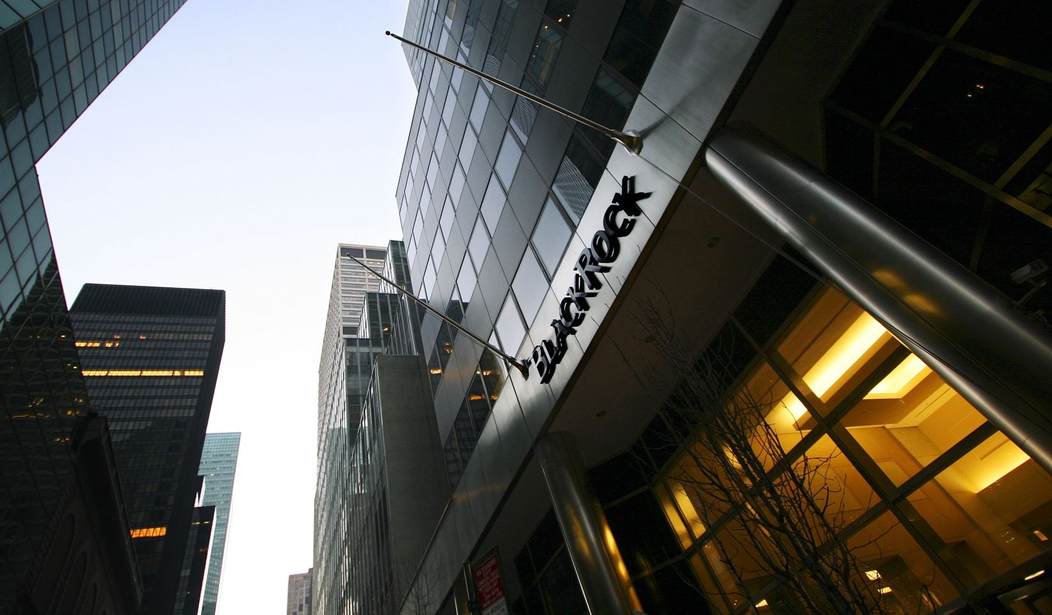(The opinions expressed by contributors are their own and do not necessarily represent the views of RedState.com.)
ESG is in the news these days, as RedState’s Bonchie reports:
Mark Neuman is an interesting guy. He lives an Environmental, Social, and Governance (ESG) life with his family (“no plastic bottles for a decade, son was in Peru on service planting trees, grow my own vegetables and herbs”)—yet as an investor he’s anti-ESG. Why would that be?
Because Neuman, the founder and CEO of anti-ESG firm Constrained Capital and creator of the ESG Orphans Index ($ORFN) fund, thinks ESG is bad for investors, bad for institutions, and bad for the economy. “I am ‘anti-ESG’ as I look to help steward investor capital to better risk-adjusted returns, without politics and social mores involved,” he told me.
https://t.co/Ds11SY4QfF
Absolutely amazing.
"ESG sucks"
Total scam. Don't be duped. Higher costs, lower returns.
Sara nails it. So much of what she talks about we agree with. Her thought process is why we created the ESG Orphans Index and $ORFN. Got $ORFN?@grilloinvest https://t.co/0FhMHxy4vg— ESG Orphan (@EsgOrphan) March 1, 2023
You’ve probably seen a lot of stories about ESG lately, so my first question to him was: what does the term mean to you?
The theory behind ESG is solid. ESG investing aims to shape corporate behavior to benefit the environment and society along with improving overall business governance.
That said, ESG is impossible to quantify. There is no universal measure of “goodness.” Every ESG item can’t be the top priority. Wall Street took a good idea and turned it into an unrecognizable and unquantifiable mess. The result: Consolidation of funds, fees, and power to very few while achieving next to none of the original goals.
What this means is that funds are actively punishing corporations that aren’t on the ESG favorites list by not investing in them. It’s not only investors who feel the pain, it’s society itself.
Investors and society have been misled by ESG investing. Higher fees, lower returns, failed objectives, and massive risks are the result of ESG. Globally, see energy and food insecurity—aka inflation. Locally, see 2022 US stock market returns due to everyone owning the same stocks under the guise of ESG.
Wall Street endured its worse year since 2008 in 2020, with major indexes dropping as much as 20 percent.
But how do you get to be an ESG darling, and who gets excluded? Not surprisingly, the ratings are determined by murky ranking agencies that apply their own criteria. As Neuman says, three different agencies could “in theory assign different E scores to the same company.”
You can be damn sure, however, that if your company deals in fossil fuels, nuclear energy, weapons, alcohol, tobacco, or gambling, you will be on the “naughty” list. Although some of these industries are vital to the economy, they’re often orphaned—excluded—from funds because they’re undesirable. “These six were left out of the market expansion from 2009-2021,” Neuman says.
If you're no fan of woke corporations then see if your pension is invested with @BlackRock @Vanguard_Group and divest now. They do NOT put your financial interest first (and that's their job. Period). pic.twitter.com/UZJVE6yDAd
— Dr Jordan B Peterson (@jordanbpeterson) February 27, 2023
I asked Neuman if he felt conflicted about living an ESG life while running an anti-ESG company. He replied that he is not in the slightest, because while one may choose to lead an environmentally friendly life, an investor’s job is to maximize returns:
…when I put on my CFA charter holder cap and researched ESG, my fiduciary moral compass blew up. ESG is full of higher fees, lower returns, failed objectives, and massive risks from misallocation of capital due to ESG imposed capital constraints. 2022 was just the beginning of weak ESG returns.
ESG investors were misled. Nobody in ESG told them that ESG costs more and lowers returns. The truth is that being virtuous has costs. [Emphasis mine] Buying organic food is ALWAYS going to cost more. When we buy organic, we know it costs more. That’s the truth, but we pay for it anyway.
My ESG choices are my own personal ones. I am an anti-ESG investor because I don’t want to invest in someone else’s idea of ESG. I want to invest where I know the truth, can measure it, and identify what I own and why. Think about Amazon as the 3rd biggest holding in ESGU/ESGV (Blackrock’s/Vanguard’s respective ESG funds). Many own those funds thinking they are doing good in ESG. Amazon is the biggest non-energy carbon footprint. It’s not ESG. AMZN was down 50% in 2022. Investors were misled by [BlackRock CEO] Larry Fink’s version of “ESG” which isn’t very ESG at all.
The ESG Orphans are the opposite of all these crowded, “ESG” stocks which are mostly mislabeled and are not good ESG companies at all.
How does this ESG movement fail the little guy? Investors think they’re doing the world “good,” but they’re also unwittingly lowering the value of their investments. Think chocolate:
The little guy as an investor is investing in companies that are forced to comply with mostly arbitrary rules and it lowers the value of the investment opportunity. Think of Hershey’s. ESG forces upon Hershey’s certain behaviors. Let’s say, sustainable chocolate. So they have to go source cocoa and sugar more expensively as they turn over more rocks and find better partners who do more extensive coddling of the cocoa and sugar.
Do you and I go into CVS to find “sustainable” chocolate, or do we care less? I like chocolate, sustainable or no, doesn’t matter. But the sustainable version costs more. It has to. Then, are the shareholders at Hershey’s asked by the company if they want to pay more to create that sustainable chocolate or are they ok with it how it is? So there’s a fiduciary duty somewhere in here that ESG is stripping from Hershey’s. If the consumer and the shareholder have not approved corporate action forced on Hershey’s by ESG, they are paying more as a consumer and losing more investment opportunity as a shareholder because ESG forced issues on the company.
Neuman then points out that the “good” people in charge may not be such role models after all:
“Doing good” a generation or two ago was going to the Peace Corps and helping out 3rd World Countries and getting paid peanuts. Now apparently Wall Street is convincing everyone that “doing good” involves multi-six figure salaries where they tell investors what the definition of “good” is? These people came from Wharton, not from the seminary.
Lastly, I asked him about pension funds, because that is the part I find most troublesome. I may choose to invest in an ESG fund, knowing that I may earn lesser returns but still willing to take the hit because I care so much. But let’s be honest—most people don’t have a clue what their pensions are invested in—they just are hoping for the best returns for their retirement. They may not be getting them:
With regard to pension investments, Blackrock and Vanguard control a lion’s share of pension moneys. They are pursuing their own “preferences” of ESG and the nebulous, vague version of ESG rated by the conflicted rating agencies without the approval of the shareholders and owners of the pension funds.
Our pension money is being used as a power play and pursuit of [Blackrock CEO] Larry Fink’s favorite ESG pet projects.
ESG is big news these days, as activist fund managers put aside profit for social change. That’s not their job. At least 11 states have already—or are looking to—divest from BlackRock, one of the biggest ESG proponents and the world’s largest investment manager with an estimated $10 trillion in assets.
Meanwhile the House Tuesday voted to torpedo a Biden Administration bill that encourages private retirement plan fiduciaries to consider ESG factors when making investment decisions for tens of millions of Americans:
Republicans say that’s a recipe for tanking millions of investment accounts, and on Tuesday, House GOP leaders called up a resolution aimed at killing the rule, which passed 216-204. Only one Democrat voted for it.
✅House Republicans PASSED a resolution fulfilling our Congressional oversight responsibility and pushing back on the Biden Administration's ESG rule that risks millions of hardworking Americans' retirement savings on Democrats’ Far Left agenda. https://t.co/Sv0bAInazC
— House Republicans (@HouseGOP) March 1, 2023
As noted, the Senate followed suit Wednesday.
Another anti-ESG fund manager, Republican Vivek Ramaswamy, entered the 2024 presidential race last week. His goals are different than Neuman’s—Neuman is more focused on returns, while Ramaswamy hopes to try to change corporate behavior at companies like BlackRock and Google—but their criticisms of ESG are similar.
ESG is a wonderful-sounding concept that most average investors are just waking up to. You may think you’re making the world a better place by investing in some of these activist funds, but the fact is that your returns may suck and you may be inadvertently supporting a whole bunch of hot-button social issues that you don’t actually agree with.
It’s crucial that investment professionals like Neuman and Ramaswamy, as well as state treasurers and the House Republicans, continue to point out the flaws in the real world of ESG—and how it’s hurting regular Americans, retirement funds, and the economy as a whole.













